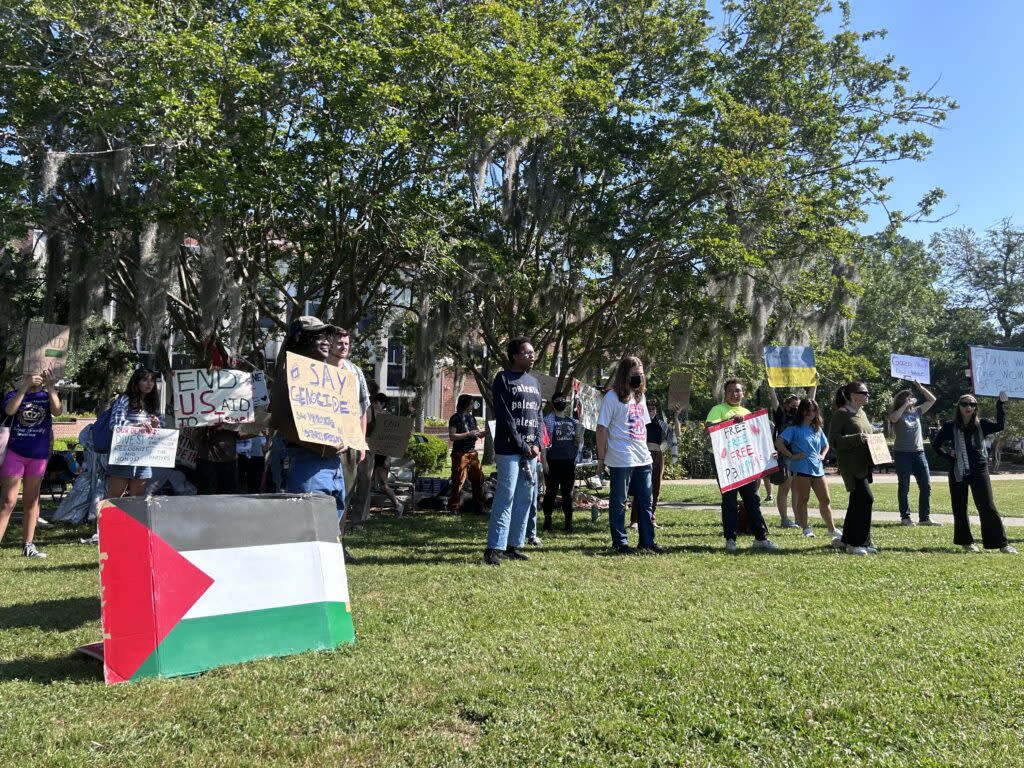Feeling targeted: Pro-Palestine group reacts to new FSU protest regulations

Tally Students for a Democratic Society held a demonstration on April 25, 2024, at Florida State University in support of pro-Palestine protesters who have gotten arrested in other college campuses. (Photo by Jackie Llanos)
Quality Journalism for Critical Times
Less than two months after students protesting the Israel-Gaza war at Florida State University were arrested and had the sprinklers turned on them, university trustees approved a revised protest policy that prohibits tents and bullhorns, among other new restrictions.
The updated “Freedom of Expression Rights and Responsibilities” regulations, approved Thursday by the FSU Board of Trustees, are “absolutely political repression,” Joelle Nuñez, president of Tally Students for a Democratic Society, told the Phoenix following the vote.
The changes include a new “prohibited conduct” section, targeting a number of tactics pro-Palestinian protesters have deployed since the war began last October, including:
Camping
Building a shelter, barrier, or other physical structure
Failing to comply with any reasonable instruction by university policy or university official actions
Using amplified sound including bullhorns or airhorns unless approved in advance
Concealing or covering the identity of a protestors with a mask, hood, or device
“A number of those absolutely do feel targeted,” Nuñez said.
“I’m guessing these rules right here are just so that next time they could have something more substantial to be like, ‘You have to get out of here,’ for the upcoming protests,” she added.
Members of the SDS chapter set up tents on FSU’s Landis Green the week before finals during the spring 2024 semester but were asked to move and lawn sprinklers were turned on them at midmorning. The protesters had set up tents at 4 a.m.
Another pro-Palestine protest took place the week before finals in the fall 2023 semester. Both events were to call on the university to divest from companies with ties to Israel.
Students now are barred from displaying flags or banners that are not “manned,” hand-held shields, helmets, tents, vehicles, shelters, or bedding.
FSU Student Body President Jackson Boisvert, a trustee, and Student Body Vice President Anthony Benn did not respond to requests for comment Friday afternoon.
No protests during finals
Meetings, assemblies, picketing activities, demonstration, protests, and gatherings may not be held during finals week unless at a university-related event. Events are now subject to attendance limits and may be held only between sunrise and sundown absent prior approval.
Nuñez discounted the university’s contention that the sprinkler incident reflected scheduled ground maintenance. “Real obtuse maintenance that usually doesn’t happen, regularly happening at the site of the protest during the protest,” she said.
“Instead of any attempt to kind of meet eye-to-eye with us with our demands, the entire time it just felt like the university was just trying to find more and more ways to get around the First Amendment,” Nuñez continued. “They would come up with every policy short of just saying, ‘You can’t do this ’cause you can’t do this,’ to try to get us to move.”
The updated policy stiffens requirements to reserve protest sites, and those who reserve a space will receive priority over “spontaneous activities.”
The university has removed recognition of the SDS chapter, and Nuñez argued the university is “holding that over our head” to discourage protests.
The policy change specifies that organizations must be registered to sponsor speeches, rallies, or other political events.
“If it was something less controversial, then I’m certain the university would be more lax,” Nuñez said. “The reason the protests even happened in the first place is because it’s clear that the university doesn’t stand on our side.”
The post Feeling targeted: Pro-Palestine group reacts to new FSU protest regulations appeared first on Florida Phoenix.

